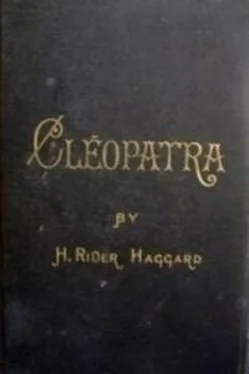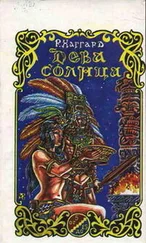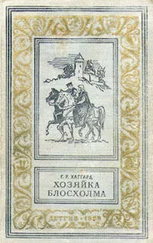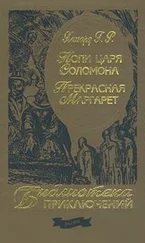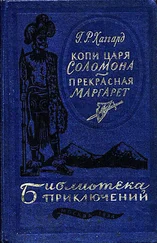Cleopatra
H. Rider Haggard
My dear Mother,
I have for a long while hoped to be allowed to dedicate some book of mine to you, and now I bring you this work, because whatever its shortcomings, and whatever judgment may be passed upon it by yourself and others, it is yet the one I should wish you to accept.
I trust that you will receive from my romance of "Cleopatra" some such pleasure as lightened the labour of its building up; and that it may convey to your mind a picture, however imperfect, of the old and mysterious Egypt in whose lost glories you are so deeply interested.
Your affectionate and dutiful Son,
H. Rider Haggard.
January 21, 1889.
The history of the ruin of Antony and Cleopatra must have struck many students of the records of their age as one of the most inexplicable of tragic tales. What malign influence and secret hates were at work, continually sapping their prosperity and blinding their judgment? Why did Cleopatra fly at Actium, and why did Antony follow her, leaving his fleet and army to destruction? An attempt is made in this romance to suggest a possible answer to these and some other questions.
The reader is asked to bear in mind, however, that the story is told, not from the modern point of view, but as from the broken heart and with the lips of an Egyptian patriot of royal blood; no mere beast–worshipper, but a priest instructed in the inmost mysteries, who believed firmly in the personal existence of the gods of Khem, in the possibility of communion with them, and in the certainty of immortal life with its rewards and punishments; to whom also the bewildering and often gross symbolism of the Osirian Faith was nothing but a veil woven to obscure secrets of the Sanctuary. Whatever proportion of truth there may have been in their spiritual claims and imaginings, if indeed there was any, such men as the Prince Harmachis have been told of in the annals of every great religion, and, as is shown by the testimony of monumental and sacred inscriptions, they were not unknown among the worshippers of the Egyptian Gods, and more especially of Isis.
Unfortunately it is scarcely possible to write a book of this nature and period without introducing a certain amount of illustrative matter, for by no other means can the long dead past be made to live again before the reader's eyes with all its accessories of faded pomp and forgotten mystery. To such students as seek a story only, and are not interested in the faith, ceremonies, or customs of the Mother of Religion and Civilisation, ancient Egypt, it is, however, respectfully suggested that they should exercise the art of skipping, and open this tale at its Second Book.
That version of the death of Cleopatra has been preferred which attributes her end to poison. According to Plutarch its actual manner is very uncertain, though popular rumour ascribed it to the bite of an asp. She seems, however, to have carried out her design under the advice of that shadowy personage, her physician, Olympus, and it is more than doubtful if he would have resorted to such a fantastic and uncertain method of destroying life.
It may be mentioned that so late as the reign of Ptolemy Epiphanes, pretenders of native blood, one of whom was named Harmachis, are known to have advanced their claims to the throne of Egypt. Moreover, there was a book of prophecy current among the priesthood which declared that after the nations of the Greeks the God Harsefi would create the "chief who is to come." It will therefore be seen that, although it lacks historical confirmation, the story of the great plot formed to stamp out the dynasty of the Macedonian Lagidae and place Harmachis on the throne is not in itself improbable. Indeed, it is possible that many such plots were entered into by Egyptian patriots during the long ages of their country's bondage. But ancient history tells us little of the abortive struggles of a fallen race.
The Chant of Isis and the Song of Cleopatra, which appear in these pages, are done into verse from the writer's prose by Mr. Andrew Lang, and the dirge sung by Charmion is translated by the same hand from the Greek of the Syrian Meleager.
In the recesses of the desolate Libyan mountains that lie behind the temple and city of Abydus, the supposed burying place of the holy Osiris, a tomb was recently discovered, among the contents of which were the papyrus rolls whereupon this history is written. The tomb itself is spacious, but otherwise remarkable only for the depth of the shaft which descends vertically from the rock–hewn cave, that once served as the mortuary chapel for the friends and relatives of the departed, to the coffin–chamber beneath. This shaft is no less than eighty–nine feet in depth. The chamber at its foot was found to contain three coffins only, though it is large enough for many more. Two of these, which in all probability inclosed the bodies of the High Priest, Amenemhat, and of his wife, father and mother of Harmachis, the hero of this history, the shameless Arabs who discovered them there and then broke up.
The Arabs broke the bodies up. With unhallowed hands they tore the holy Amenemhat and the frame of her who had, as it is written, been filled with the spirit of the Hathors—tore them limb from limb, searching for treasure amidst their bones—perhaps, as is their custom, selling the very bones for a few piastres to the last ignorant tourist who came their way, seeking what he might destroy. For in Egypt the unhappy, the living find their bread in the tombs of the great men who were before them.
But as it chanced, some little while afterwards, one who is known to this writer, and a doctor by profession, passed up the Nile to Abydus, and became acquainted with the men who had done this thing. They revealed to him the secret of the place, telling him that one coffin yet remained entombed. It seemed to be the coffin of a poor person, they said, and therefore, being pressed for time, they had left it unviolated. Moved by curiosity to explore the recesses of a tomb as yet unprofaned by tourists, my friend bribed the Arabs to show it to him. What ensued I will give in his own words, exactly as he wrote it to me:
"I slept that night near the Temple of Seti, and started before daybreak on the following morning. With me were a cross–eyed rascal named Ali—Ali Baba I named him—the man from whom I got the ring which I am sending you, and a small but choice assortment of his fellow thieves. Within an hour after sunrise we reached the valley where the tomb is. It is a desolate place, into which the sun pours his scorching heat all the long day through, till the huge brown rocks which are strewn about become so hot that one can scarcely bear to touch them, and the sand scorches the feet. It was already too hot to walk, so we rode on donkeys, some way up the valley—where a vulture floating far in the blue overhead was the only other visitor—till we came to an enormous boulder polished by centuries of action of sun and sand. Here Ali halted, saying that the tomb was under the stone. Accordingly, we dismounted, and, leaving the donkeys in charge of a fellah boy, went up to the rock. Beneath it was a small hole, barely large enough for a man to creep through. Indeed it had been dug by jackals, for the doorway and some part of the cave were entirely silted up, and it was by means of this jackal hole that the tomb had been discovered. Ali crept in on his hands and knees, and I followed, to find myself in a place cold after the hot outside air, and, in contrast with the light, filled with a dazzling darkness. We lit our candles, and, the select body of thieves having arrived, I made an examination. We were in a cave the size of a large room, and hollowed by hand, the further part of the cave being almost free from drift–dust. On the walls are religious paintings of the usual Ptolemaic character, and among them one of a majestic old man with a long white beard, who is seated in a carved chair holding a wand in his hand. [1] This, I take it, is a portrait of Amenemhat himself.— Editor.
Читать дальше
